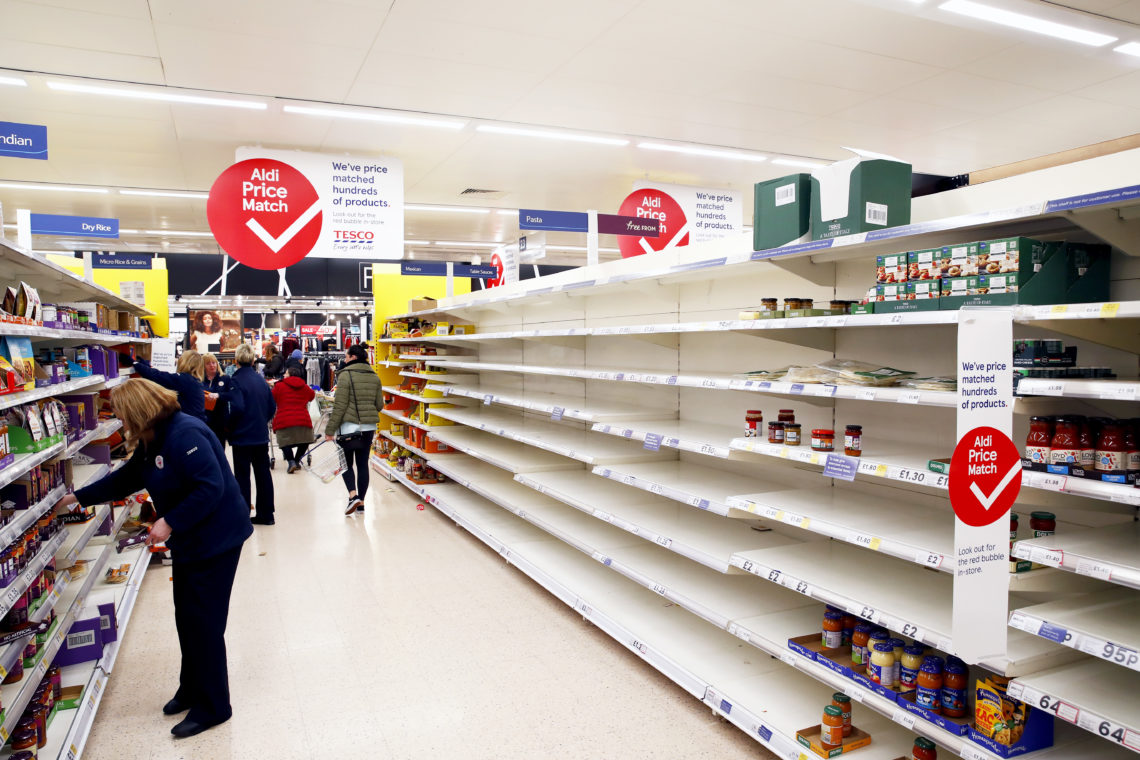 Empty shelves in a supermarket on March 18, 2020. (Photo by Clive Brunskill/Getty Images)
Empty shelves in a supermarket on March 18, 2020. (Photo by Clive Brunskill/Getty Images) On a frigid February day in 1988, I held my father’s hand as we walked through the nearly empty streets of Tehran. Roughly 30% of the capital’s residents had fled because of the “War of the Cities,” a savage series of air raids and missile attacks perpetrated by then-Iraqi President Saddam Hussein as a way to demoralize Iranians during the Iran-Iraq War (1980-88).
Earlier that day, when my father decided to take advantage of a rare lull in bombardments to buy food, I held onto his leg with all my 6-year-old might, like a sloth wrapped around a branch.
As we walked, I looked at the sky for assurance that there were no Iraqi warplanes. The sky was painted gray with Tehran’s famous pollution clouds, which provided odd comfort.
We entered a small general store and my father instructed me to find as many canned goods as possible, regardless of what they contained.
Nothing had prepared me for one of the most traumatizing sights of my life: Naked store shelves.
There was nothing. Only lonely price tags that now dangled off shelves formerly containing items like canned beans and halva.
I scuttled to the back of the store, where the shopkeeper kept his mop and broom. Next to them was a small box of individually wrapped sponges and something that resembled a can. I pushed the sponges aside to find a can of button mushrooms, and squealed with delight over my discovery.
“Brother,” my father said to the shopkeeper in a traditional greeting between Iranian men, “are you saving all the canned foods for the ayatollah?”
“I swear,” the man cried, “As soon as the truck delivered the food this morning, people descended upon me and ravaged every shelf. Believe me, I don’t even have anything to take home to my own family.”
Standing beside my father, I was overcome with anxiety and fear. I relied solely on adults to provide my food, shelter and safety but now those adults seemed desperate and out of control.
I didn’t experience these same sensations for 30 years, until last week, when I entered a West Los Angeles Target and found one empty shelf after another. Where was I?
Standing in that Target — a ubiquitous symbol of American abundance — there was something about the sight of those empty shelves that pushed me over the edge.
Pushing the red shopping cart, with my two small children, I felt a semblance of post-traumatic stress disorder (PTSD) like I was back in a war-torn, Third World country. It’s the same PTSD that makes me involuntarily throw myself to the sidewalk every time I hear the blaring siren of a fire truck, because it brings me back to the sound of the air raid sirens I heard as a child in Tehran before the terror of approaching Iraqi warplanes.
Standing in that Target — a ubiquitous symbol of American abundance — there was something about the sight of those empty shelves that pushed me over the edge.
The American dream is like Abraham Maslow’s hierarchical pyramid — not of needs, but of certain promises: At the top stands the glorious promise of freedom, whether freedom of religion, the press or otherwise. There are also levels that correlate to promises for “success,” however it’s defined. But at the bottom of that pyramid is a certain promise of basic needs that will be met; promises of a First World country where blessed abundance dictates that store shelves are never empty and that yes, we all have access to toilet paper.
When I came to the U.S., I had certain dreams based on these American promises, and I still have them.
Iran taught me to value a can of button mushrooms, but fears over the coronavirus have taught me that even in America, abundance is a privilege.
Tabby Refael is a Los Angeles-based writer and speaker.





















 More news and opinions than at a Shabbat dinner, right in your inbox.
More news and opinions than at a Shabbat dinner, right in your inbox.